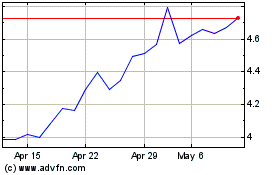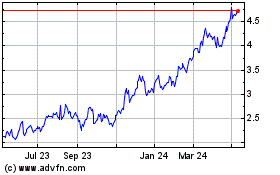By Georgi Kantchev
The euro rallied from early losses, following Italian voters'
rejection of a government-backed referendum, but the volatile day
raises concerns about how the currency survives an era of populist
politicians and diverging economies.
The euro was at $1.0765 late Monday in New York, up 0.9% against
the dollar. Overnight, it had been down as much as 1%. The
referendum's failure meant the resignation of Italian Prime
Minister Matteo Renzi. Mr. Renzi's antagonists, the
antiestablishment 5 Star Movement, have questioned the common
currency and called for a nonbinding referendum on Italy's
membership in it.
The referendum sets up a political vacuum in Italy that could be
treacherous for the country's banks. A plan to rescue the weakest,
Monte dei Paschi di Siena SpA, is likely scuttled, and it may need
to be nationalized. If other banks stumble, and if concerns rise
for banks outside of Italy, the euro could be stressed further.
European stock markets rose Monday, except for Italy's, which
was hurt by sharp falls in banking shares and ended down 0.2%.
Monday's calm trading, outside of Italian banks, suggested
investors believe the vote on its own doesn't challenge the
eurozone. There was no clamoring for havens: Long-term German bonds
weakened, as did gold. Italian bonds also fell, and their yields
rose more than Germany's. That gap signals some concern about
Italy, though the gap widened only modestly.
Born in 1999, the euro has survived tougher trials. In 2010, its
member countries set aside deep resistance to paying for each
others' debts and bailed out Greece and then Ireland. The next
year, Portugal. And in following years, Spain, for its banks, and
Cyprus.
The left-wing Syriza party took control of Greece in 2015 full
of rumblings about a return to the drachma. Yet Greece stomached
capital controls and a new bailout and didn't leave the euro.
For investors, however, the repeated tests erode confidence and
reawaken existential questions. "We've seen these games many times
before," said Richard Benson, co-head of portfolio investments at
Millennium Global Investments in London. "The euro recovers, but
each of these political events goes by and the eurozone takes
another hit, so one wonders how long this can be sustained."
And next year will pose many more tests. Elections will come in
2017 in Germany, France and the Netherlands. Consulting firm Bain
& Co. has told clients to "withhold new investments" in Western
Europe, warning that a breakup of the euro is likely.
An eventual fracturing of the common currency would likely be a
calamitous event for financial markets. Widespread capital controls
would be needed to prevent destabilizing rushes of money from
countries deemed likely to have a weak posteuro currency to those
expected to have a strong one. Huge swaths of financial
infrastructure, including derivatives markets and common banking
systems, would need to be disaggregated.
Indeed, fears of the chaos even one country's exit would cause
proved to be a powerful glue holding the eurozone together during
its debt crisis. Since then, there has been a flurry of changes
meant to bind it still tighter, most notably, closer and more
consistent supervision of banks, which triggered trouble in
Ireland, Cyprus and Spain, and tougher fiscal rules, whose
transgressions were the undoing of Greece and Portugal.
Yet the work isn't fully done: The Continentwide "banking union"
is still elusive, and there is little movement toward the
more-distant goal of the sort of federal treasury and budget that
redistribute money across the 50 states of the U.S.
And with a host of euroskeptic parties braying at the heels of
governments now, the prospects for either have receded further.
The euro, as a financial instrument, has declined since early
2014, when it was near $1.40. But that shift has been led by a
sharp divergence in monetary policy: The U.S. Federal Reserve is
moving away from monetary easing, while the European Central Bank
is deep in an experiment of negative interest rates. To a large
degree, a weak euro is a good thing for the eurozone's efforts to
build exports and return ultralow inflation to healthier levels.
Analysts said that monetary-policy split will continue to keep the
euro depressed, but that politics is looming as a force.
"The euro is in a downward spiral," said Francesco Filia, who
manages $300 million as head of Fasanara Capital in London. Mr.
Filia is betting that the euro will fall against the dollar as
France's elections draw closer. "Ultimately, we are very bearish
for the prospects of the European Union surviving the next couple
of years in its current form."
To be sure, the eurozone's demise has been predicted many times
before. The currency enjoys solid popularity among Europeans who
use it. And while euroskeptic parties have made strides in opinion
polls, they have had less success reaching public office in the
eurozone. On Sunday, Austrians voted against a far-right populist
candidate for the largely ceremonial post of president.
"Unless and until an antieuro group is running a euro-area
government, outcomes like today create intraday volatility rather
than trend euro weakness," said John Normand, head of international
foreign-exchange and rates strategy at J.P. Morgan Chase &
Co.
Several analysts said the euro could reach parity with the
dollar next year. That hasn't happened since 2002. Before the
referendum, Deutsche Bank AG forecast the euro would fall to $0.95
by the end of next year, while Citigroup Inc. foresees the euro
tumbling to $0.98 in the next six to 12 months.
"The euro is a politically driven currency now," said Dominic
Bunning, senior foreign-exchange strategist at HSBC Holdings PLC.
Mr. Bunning said he has been recommending clients bet against the
euro since before the referendum, partly because of the rise of
euroskeptic parties.
A mitigating factor for the euro might come from an unexpected
place, a strengthening European economy. There are tentative signs
that the eurozone, which has been plagued by low growth and high
unemployment since the financial crisis, is turning the corner.
The unemployment rate across the 19 countries that use the euro
fell to its lowest level since mid-2009 in October, while retail
sales rose at the fastest rate in more than two years that month,
according to official statistics.Manufacturing and consumer
optimism have also rebounded, data show.
The end of a long period of economic weakness could give the ECB
enough comfort, eventually, to pull out of negative rates and slow
down or stop its bond purchases. That would boost the euro. Another
effect of a strengthening economy may be to dull the
disintegrationist push of populist parties.
The next big test for Europe could come from France, a country
that has helped push eurozone integration. Current polling suggests
that the far-right National Front leader Marine Le Pen is a leading
contender in France's presidential election next year, though she
isn't the favorite. Ms. Le Pen wants to pull France out of the
euro.
Mark Dowding, co-head of investment-grade debt at BlueBay Asset
Management LLP, has sold French bonds in recent weeks ahead of next
year's presidential elections.
"Italy voting out Renzi is one thing, but if the French were to
vote for Le Pen, it could be the beginning of the end for the
euro," he said.
--Christopher Whittall, David Wighton and Ira Iosebashvili
contributed to this article.
Write to Georgi Kantchev at georgi.kantchev@wsj.com
(END) Dow Jones Newswires
December 05, 2016 19:32 ET (00:32 GMT)
Copyright (c) 2016 Dow Jones & Company, Inc.
Banca Monte Dei Paschi D... (BIT:BMPS)
Historical Stock Chart
From Mar 2024 to Apr 2024

Banca Monte Dei Paschi D... (BIT:BMPS)
Historical Stock Chart
From Apr 2023 to Apr 2024
